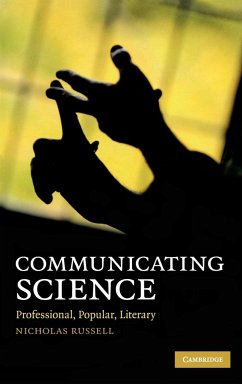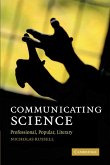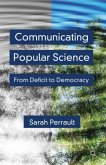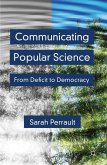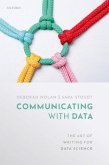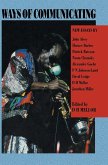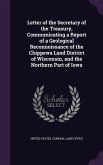Nicholas Russell
Communicating Science
Nicholas Russell
Communicating Science
- Gebundenes Buch
- Merkliste
- Auf die Merkliste
- Bewerten Bewerten
- Teilen
- Produkt teilen
- Produkterinnerung
- Produkterinnerung
Ideal for students and practitioners in science, engineering and medicine, this book gives an insight into science's place in society.
Andere Kunden interessierten sich auch für
![Communicating Science Communicating Science]() Nicholas RussellCommunicating Science49,99 €
Nicholas RussellCommunicating Science49,99 €![Communicating Popular Science Communicating Popular Science]() S. PerraultCommunicating Popular Science75,99 €
S. PerraultCommunicating Popular Science75,99 €![Communicating Popular Science Communicating Popular Science]() S. PerraultCommunicating Popular Science82,99 €
S. PerraultCommunicating Popular Science82,99 €![Communicating with Data Communicating with Data]() Deborah NolanCommunicating with Data131,99 €
Deborah NolanCommunicating with Data131,99 €![Ways of Communicating Ways of Communicating]() Ways of Communicating113,99 €
Ways of Communicating113,99 €![Letter of the Secretary of the Treasury, Communicating a Report of a Geological Reconnoissance of the Chippewa Land District of Wisconsin, and the Northern Part of Iowa Letter of the Secretary of the Treasury, Communicating a Report of a Geological Reconnoissance of the Chippewa Land District of Wisconsin, and the Northern Part of Iowa]() Letter of the Secretary of the Treasury, Communicating a Report of a Geological Reconnoissance of the Chippewa Land District of Wisconsin, and the Northern Part of Iowa32,99 €
Letter of the Secretary of the Treasury, Communicating a Report of a Geological Reconnoissance of the Chippewa Land District of Wisconsin, and the Northern Part of Iowa32,99 €![Theoretical Virtues in Science Theoretical Virtues in Science]() Samuel SchindlerTheoretical Virtues in Science114,99 €
Samuel SchindlerTheoretical Virtues in Science114,99 €-
-
-
Ideal for students and practitioners in science, engineering and medicine, this book gives an insight into science's place in society.
Hinweis: Dieser Artikel kann nur an eine deutsche Lieferadresse ausgeliefert werden.
Hinweis: Dieser Artikel kann nur an eine deutsche Lieferadresse ausgeliefert werden.
Produktdetails
- Produktdetails
- Verlag: Cambridge University Press
- Seitenzahl: 350
- Erscheinungstermin: 1. November 2010
- Englisch
- Abmessung: 235mm x 157mm x 25mm
- Gewicht: 719g
- ISBN-13: 9780521113830
- ISBN-10: 0521113830
- Artikelnr.: 26552854
- Herstellerkennzeichnung
- Libri GmbH
- Europaallee 1
- 36244 Bad Hersfeld
- gpsr@libri.de
- Verlag: Cambridge University Press
- Seitenzahl: 350
- Erscheinungstermin: 1. November 2010
- Englisch
- Abmessung: 235mm x 157mm x 25mm
- Gewicht: 719g
- ISBN-13: 9780521113830
- ISBN-10: 0521113830
- Artikelnr.: 26552854
- Herstellerkennzeichnung
- Libri GmbH
- Europaallee 1
- 36244 Bad Hersfeld
- gpsr@libri.de
Nicholas Russell is Emeritus Reader in Science Communication in the Department of Humanities at Imperial College, London.
Introduction: what this book is about and why you might want to read it;
Prologue: three orphans share a common paternity: professional science
communication, popular journalism, and literary fiction are not as separate
as they seem; Part I. Professional Science Communication: 1. Spreading the
word: the endless struggle to publish professional science; 2. Walk like an
Egyptian: the alien feeling of professional science writing; 3. The
future's bright? Professional science communication in the age of the
internet; 4. Counting the horse's teeth: professional standards in
science's barter economy; 5. Separating the wheat from the chaff: peer
review on trial; Part II. Science for the Public: What Science Do People
Need and How Might They Get It?: 6. The Public Understanding of Science
(PUS) movement and its problems; 7. Public engagement with science and
technology (PEST): fine principle, difficult practice; 8. Citizen
scientists? Democratic input into science policy; 9. Teaching and learning
science in schools: implications for popular science communication; Part
III. Popular Science Communication: The Press and Broadcasting: 10. What
every scientist should know about mass media; 11. What every scientist
should know about journalists; 12. The influence of new media; 13. How the
media represents science; 14. How should science journalists behave?; Part
IV. The Origins of Science in Cultural Context: Five Historic Dramas: 15. A
terrible storm in Wittenberg: natural knowledge through sorcery and evil;
16. A terrible storm in the Mediterranean: controlling nature with white
magic and religion; 17. Thieving magpies: the subtle art of false
projecting; 18. Foolish virtuosi: natural philosophy emerges as a distinct
discipline but many cannot take it seriously; 19. Is scientific knowledge
'true' or should it just be 'truthfully' deployed?; Part V. Science in
Literature: 20. Science and the Gothic: the three big nineteenth-century
monster stories; 21. Science fiction: serious literature of ideas or
low-grade entertainment?; 22. Science in British literary fiction; 23.
Science on stage: the politics and ethics of science in cultural and
educational contexts.
Prologue: three orphans share a common paternity: professional science
communication, popular journalism, and literary fiction are not as separate
as they seem; Part I. Professional Science Communication: 1. Spreading the
word: the endless struggle to publish professional science; 2. Walk like an
Egyptian: the alien feeling of professional science writing; 3. The
future's bright? Professional science communication in the age of the
internet; 4. Counting the horse's teeth: professional standards in
science's barter economy; 5. Separating the wheat from the chaff: peer
review on trial; Part II. Science for the Public: What Science Do People
Need and How Might They Get It?: 6. The Public Understanding of Science
(PUS) movement and its problems; 7. Public engagement with science and
technology (PEST): fine principle, difficult practice; 8. Citizen
scientists? Democratic input into science policy; 9. Teaching and learning
science in schools: implications for popular science communication; Part
III. Popular Science Communication: The Press and Broadcasting: 10. What
every scientist should know about mass media; 11. What every scientist
should know about journalists; 12. The influence of new media; 13. How the
media represents science; 14. How should science journalists behave?; Part
IV. The Origins of Science in Cultural Context: Five Historic Dramas: 15. A
terrible storm in Wittenberg: natural knowledge through sorcery and evil;
16. A terrible storm in the Mediterranean: controlling nature with white
magic and religion; 17. Thieving magpies: the subtle art of false
projecting; 18. Foolish virtuosi: natural philosophy emerges as a distinct
discipline but many cannot take it seriously; 19. Is scientific knowledge
'true' or should it just be 'truthfully' deployed?; Part V. Science in
Literature: 20. Science and the Gothic: the three big nineteenth-century
monster stories; 21. Science fiction: serious literature of ideas or
low-grade entertainment?; 22. Science in British literary fiction; 23.
Science on stage: the politics and ethics of science in cultural and
educational contexts.
Introduction: what this book is about and why you might want to read it;
Prologue: three orphans share a common paternity: professional science
communication, popular journalism, and literary fiction are not as separate
as they seem; Part I. Professional Science Communication: 1. Spreading the
word: the endless struggle to publish professional science; 2. Walk like an
Egyptian: the alien feeling of professional science writing; 3. The
future's bright? Professional science communication in the age of the
internet; 4. Counting the horse's teeth: professional standards in
science's barter economy; 5. Separating the wheat from the chaff: peer
review on trial; Part II. Science for the Public: What Science Do People
Need and How Might They Get It?: 6. The Public Understanding of Science
(PUS) movement and its problems; 7. Public engagement with science and
technology (PEST): fine principle, difficult practice; 8. Citizen
scientists? Democratic input into science policy; 9. Teaching and learning
science in schools: implications for popular science communication; Part
III. Popular Science Communication: The Press and Broadcasting: 10. What
every scientist should know about mass media; 11. What every scientist
should know about journalists; 12. The influence of new media; 13. How the
media represents science; 14. How should science journalists behave?; Part
IV. The Origins of Science in Cultural Context: Five Historic Dramas: 15. A
terrible storm in Wittenberg: natural knowledge through sorcery and evil;
16. A terrible storm in the Mediterranean: controlling nature with white
magic and religion; 17. Thieving magpies: the subtle art of false
projecting; 18. Foolish virtuosi: natural philosophy emerges as a distinct
discipline but many cannot take it seriously; 19. Is scientific knowledge
'true' or should it just be 'truthfully' deployed?; Part V. Science in
Literature: 20. Science and the Gothic: the three big nineteenth-century
monster stories; 21. Science fiction: serious literature of ideas or
low-grade entertainment?; 22. Science in British literary fiction; 23.
Science on stage: the politics and ethics of science in cultural and
educational contexts.
Prologue: three orphans share a common paternity: professional science
communication, popular journalism, and literary fiction are not as separate
as they seem; Part I. Professional Science Communication: 1. Spreading the
word: the endless struggle to publish professional science; 2. Walk like an
Egyptian: the alien feeling of professional science writing; 3. The
future's bright? Professional science communication in the age of the
internet; 4. Counting the horse's teeth: professional standards in
science's barter economy; 5. Separating the wheat from the chaff: peer
review on trial; Part II. Science for the Public: What Science Do People
Need and How Might They Get It?: 6. The Public Understanding of Science
(PUS) movement and its problems; 7. Public engagement with science and
technology (PEST): fine principle, difficult practice; 8. Citizen
scientists? Democratic input into science policy; 9. Teaching and learning
science in schools: implications for popular science communication; Part
III. Popular Science Communication: The Press and Broadcasting: 10. What
every scientist should know about mass media; 11. What every scientist
should know about journalists; 12. The influence of new media; 13. How the
media represents science; 14. How should science journalists behave?; Part
IV. The Origins of Science in Cultural Context: Five Historic Dramas: 15. A
terrible storm in Wittenberg: natural knowledge through sorcery and evil;
16. A terrible storm in the Mediterranean: controlling nature with white
magic and religion; 17. Thieving magpies: the subtle art of false
projecting; 18. Foolish virtuosi: natural philosophy emerges as a distinct
discipline but many cannot take it seriously; 19. Is scientific knowledge
'true' or should it just be 'truthfully' deployed?; Part V. Science in
Literature: 20. Science and the Gothic: the three big nineteenth-century
monster stories; 21. Science fiction: serious literature of ideas or
low-grade entertainment?; 22. Science in British literary fiction; 23.
Science on stage: the politics and ethics of science in cultural and
educational contexts.

